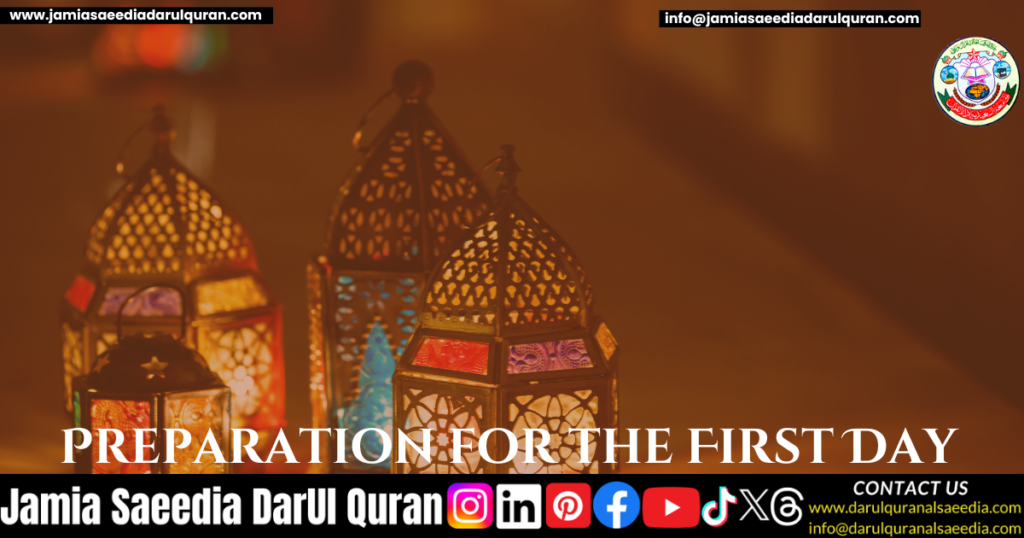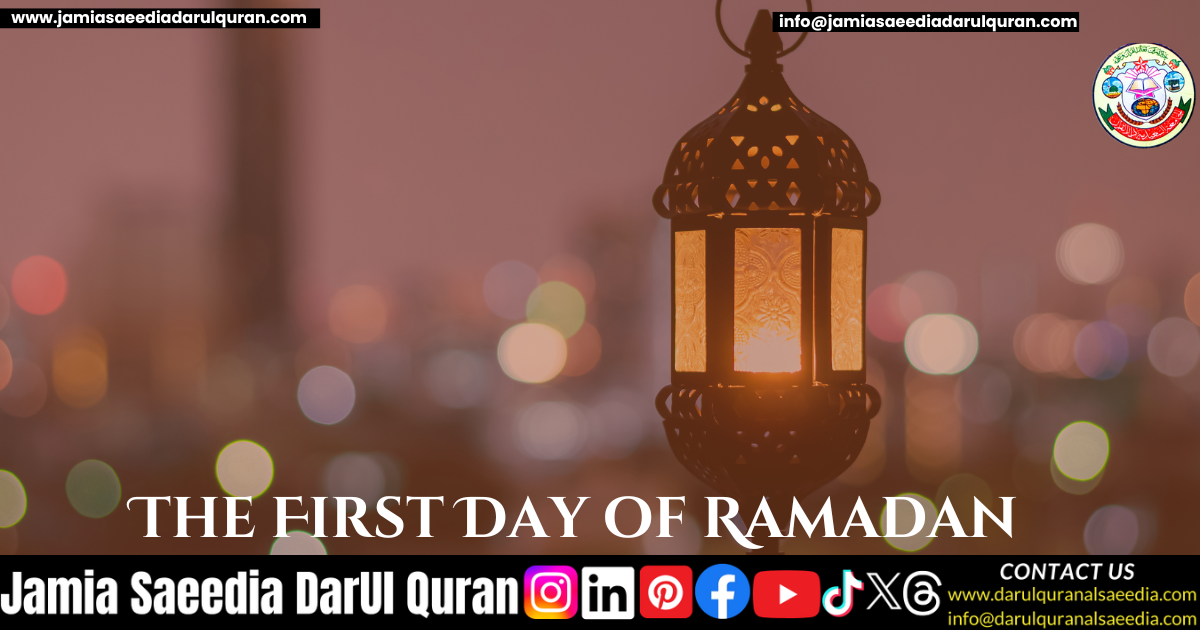The first day of Ramadan holds a special place in the heart of every Muslim. It marks the beginning of a month filled with spiritual purification, self-discipline, and divine blessings. In this article, we will explore the preparation, virtues, and spiritual experiences associated with the first day of Ramadan. Additionally, we will highlight the role of Jamia Saeedia Darul Quran, a renowned Islamic institution, in guiding Muslims during this sacred month.
Read More: Rozah Rakhane ki Niyat
The First Day of Ramadan: A Sacred Beginning
The first day of Ramadan brings immense joy and excitement to Muslims worldwide. It is not just a physical act of abstaining from food and drink but also a spiritual journey that brings believers closer to Allah (SWT). This day symbolizes a fresh start, a chance to seek forgiveness, and an opportunity to reconnect with faith.
Jamia Saeedia Darul Quran, a respected institution dedicated to Quranic education, plays a vital role in helping Muslims prepare for Ramadan through its special programs, lectures, and workshops.
Preparation for the First Day: Spiritual and Physical

Preparing for the first day of Ramadan involves both spiritual and physical readiness. Here’s how you can prepare:
1. Spiritual Preparation
- Prayer and Repentance: Begin by seeking forgiveness from Allah (SWT) and making sincere repentance.
- Pure Intention: Ensure your intention for fasting is solely for the sake of Allah (SWT).
- Quran Recitation: Start reciting the Quran regularly. Jamia Saeedia Darul Quran offers guidance on understanding and reflecting on Quranic teachings.
2. Physical Preparation
- Health Check: Maintain a balanced diet and stay hydrated before Ramadan begins.
- Suhoor Importance: Never miss Suhoor (pre-dawn meal), as it provides energy for the day.
- Sleep Schedule: Adjust your sleep routine to accommodate Taraweeh prayers and early Suhoor.
Virtues of the First Day of Ramadan
The first day of Ramadan is filled with countless blessings and virtues. Some of the key virtues include:
- Forgiveness of Sins: The Prophet Muhammad (ﷺ) said, “Whoever fasts during Ramadan with faith and seeking reward, his previous sins will be forgiven.” (Bukhari & Muslim)
- Divine Mercy: Ramadan is a month of mercy, blessings, and forgiveness. The first day sets the tone for receiving these divine gifts.
- Cultivating Taqwa: Fasting instills Taqwa (God-consciousness), which helps Muslims avoid sins and stay on the righteous path.
Jamia Saeedia Darul Quran organizes special lectures and workshops during Ramadan to educate Muslims about the virtues of fasting and the spiritual significance of this blessed month.
The Spiritual Experience of the First Fast
The first day of fasting is a unique experience for every Muslim. It is not just about feeling hunger and thirst but also about realizing the greatness of Allah (SWT).
- Patience and Gratitude: Fasting teaches patience and gratitude for Allah’s blessings.
- Acceptance of Prayers: Ramadan is a time when prayers are more likely to be accepted. Use the first day to make heartfelt supplications.
- Empathy for the Needy: Fasting helps Muslims understand the struggles of the poor and encourages acts of charity.
Jamia Saeedia Darul Quran actively participates in charitable activities during Ramadan, encouraging Muslims to help those in need and embody the spirit of generosity.
Duas for the First Day of Ramadan
Duas (supplications) hold special significance on the first day of Ramadan. Here are some important duas:
- Dua for Suhoor:
“وَبِصَوْمِ غَدٍ نَّوَيْتُ مِنْ شَهْرِ رَمَضَانَ.”
(I intend to fast tomorrow in the month of Ramadan.) - Dua for Iftar:
“اللَّهُمَّ لَكَ صُمْتُ وَعَلَى رِزْقِكَ أَفْطَرْتُ.”
(O Allah, I fasted for You, and I break my fast with Your provisions.) - General Dua:
“اللَّهُمَّ اجْعَلْ صِيَامِي فِيهِ صِيَامَ الصَّائِمِينَ، وَقِيَامِي فِيهِ قِيَامَ الْقَائِمِينَ، وَنَبِّهْنِي فِيهِ عَنْ نَوْمَةِ الْغَافِلِينَ.”
(O Allah, make my fasting like the fasting of those who truly fast, and my standing in prayer like those who truly stand in prayer. Wake me up from the sleep of the heedless.)
Iftar on the First Day: Sunnah and Etiquette
Iftar (breaking the fast) is a moment of joy and gratitude. Here are some Sunnahs and etiquettes to follow:
- Break Fast with Dates: The Prophet Muhammad (ﷺ) used to break his fast with dates. If dates are unavailable, use water.
- Dua Acceptance: The time of Iftar is a blessed moment for making dua.
- Simplicity: Keep Iftar simple and avoid extravagance.
The First Day of Ramadan: A New Beginning
The first day of Ramadan is a message of renewal and hope for every Muslim. It is a time to seek forgiveness, reconnect with Allah (SWT), and embrace the blessings of this holy month.
With the guidance of Jamia Saeedia Darul Quran, Muslims can deepen their understanding of Ramadan’s spiritual teachings and make the most of this blessed month.
رمضان المبارک کا پہلا روزہ: فضائل، تیاری، اور روحانی تجربہ
مضان المبارک کا پہلا روزہ ہر مسلمان کے لیے ایک خاص اہمیت رکھتا ہے۔ یہ نہ صرف روحانی پاکیزگی اور تقویٰ کا آغاز ہوتا ہے بلکہ اس ماہ مبارک کی برکتوں اور رحمتوں کو سمیٹنے کا پہلا قدم بھی ہے۔ اس مضمون میں ہم رمضان کے پہلے روزے کی تیاری، اس کے فضائل، اور اس کے روحانی اثرات پر تفصیل سے بات کریں گے۔ نیز، جامعہ سعیدیہ دارالقرآن کے تعاون سے رمضان کی روحانی تربیت اور قرآن پاک کی تعلیمات کو بھی شامل کیا گیا ہے۔
رمضان المبارک کا پہلا روزہ: ایک مقدس آغاز
رمضان المبارک کا پہلا روزہ ہر مسلمان کے دل میں خوشی اور جذبے کی لہر دوڑا دیتا ہے۔ یہ روزہ نہ صرف جسمانی طور پر بلکہ روحانی طور پر بھی ایک نئے سفر کا آغاز ہوتا ہے۔ اللہ تعالیٰ کے احکامات پر عمل کرتے ہوئے، روزہ دار اپنے رب کے قریب ہونے کا احساس کرتا ہے۔
جامعہ سعیدیہ دارالقرآن، جو قرآن پاک کی تعلیم و تربیت کا ایک معتبر ادارہ ہے، رمضان کے موقع پر خصوصی پروگرامز کا اہتمام کرتا ہے تاکہ طلباء اور عوام الناس کو رمضان کی برکتوں سے مستفید ہونے کا موقع مل سکے۔
پہلے روزے کی تیاری: روحانی اور جسمانی طور پر

رمضان کے پہلے روزے کی تیاری صرف کھانے پینے کی چیزوں تک محدود نہیں ہونی چاہیے۔ اس کی تیاری روحانی اور جسمانی دونوں سطحوں پر ہونی چاہیے۔
1. روحانی تیاری
- دعا اور استغفار: رمضان کی آمد سے پہلے ہی اللہ تعالیٰ سے دعا کریں کہ وہ آپ کو اس ماہ مبارک کے لیے تیار کرے۔
- نیت کی درستگی: روزے کی نیت کو خالص رکھیں اور اسے صرف اللہ کی رضا کے لیے رکھیں۔
- قرآن پاک کی تلاوت: جامعہ سعیدیہ دارالقرآن کے اساتذہ کی رہنمائی میں قرآن پاک کی تلاوت کا معمول بنائیں تاکہ آپ اس ماہ میں اسے بہتر طریقے سے سمجھ سکیں۔
2. جسمانی تیاری
- صحت کا خیال: رمضان سے پہلے ہی اپنی صحت کا خیال رکھیں۔ متوازن غذا کھائیں اور پانی کا استعمال بڑھائیں۔
- سحری کی اہمیت: سحری کا وقت روزے کی قوت اور توانائی کا ذریعہ ہوتا ہے۔ اسے ہرگز نہ چھوڑیں۔
- نیند کا خیال: رمضان میں نیند کا شیڈول تبدیل ہو جاتا ہے، اس لیے پہلے سے ہی اپنے جسم کو تیار کریں۔
پہلے روزے کے فضائل
رمضان المبارک کا پہلا روزہ بے شمار فضائل اور برکتوں کا حامل ہوتا ہے۔ چند اہم فضائل درج ذیل ہیں:
- گناہوں کی معافی: رسول اللہ ﷺ نے فرمایا، “جو شخص رمضان کے روزے ایمان اور احتساب کے ساتھ رکھے، اس کے پچھلے تمام گناہ معاف کر دیے جاتے ہیں۔” (بخاری و مسلم)
- رحمتوں کا نزول: رمضان کا مہینہ رحمتوں، برکتوں، اور مغفرت کا مہینہ ہے۔ پہلا روزہ ان رحمتوں کو سمیٹنے کا پہلا موقع ہوتا ہے۔
- تقویٰ کی تربیت: روزہ تقویٰ کی صفت پیدا کرتا ہے، جو انسان کو گناہوں سے بچاتا ہے۔
جامعہ سعیدیہ دارالقرآن کے اساتذہ رمضان کے دوران خصوصی لیکچرز اور ورکشاپس کا اہتمام کرتے ہیں تاکہ طلباء اور عوام الناس کو روزے کے فضائل اور اس کی روحانی اہمیت سے آگاہ کیا جا سکے۔
پہلے روزے کا روحانی تجربہ
رمضان کے پہلے روزے کا تجربہ ہر مسلمان کے لیے منفرد ہوتا ہے۔ یہ دن نہ صرف بھوک اور پیاس کا احساس دلاتا ہے بلکہ انسان کو اللہ تعالیٰ کی عظمت کا احساس بھی دلاتا ہے۔
- صبر اور شکر: روزہ صبر کی تربیت دیتا ہے اور انسان کو اللہ کی نعمتوں کا شکر ادا کرنے پر آمادہ کرتا ہے۔
- دعاؤں کی قبولیت: رمضان میں دعاؤں کی قبولیت کا وقت ہوتا ہے۔ پہلے روزے میں خاص طور پر اللہ سے اپنی حاجات مانگیں۔
- غریبوں کی مدد: روزہ رکھ کر انسان غریبوں اور ضرورت مندوں کی تکلیف کو محسوس کرتا ہے، جس سے اس میں ہمدردی کا جذبہ پیدا ہوتا ہے۔
جامعہ سعیدیہ دارالقرآن کے زیر اہتمام رمضان کے دوران غریبوں اور ضرورت مندوں کی مدد کے لیے خصوصی پروگرامز کا اہتمام کیا جاتا ہے، تاکہ روزہ داروں کو اس مقدس مہینے میں صدقہ و خیرات کی ترغیب دی جا سکے۔
پہلے روزے کی دعائیں
رمضان کے پہلے روزے میں دعاؤں کو خاص اہمیت حاصل ہے۔ چند اہم دعائیں درج ذیل ہیں:
- سحری کی دعا:
“وَبِصَوْمِ غَدٍ نَّوَيْتُ مِنْ شَهْرِ رَمَضَانَ.”
(میں نے رمضان کے روزے کی نیت کی۔) - افطاری کی دعا:
“اللَّهُمَّ لَكَ صُمْتُ وَعَلَى رِزْقِكَ أَفْطَرْتُ.”
(اے اللہ! میں نے تیرے لیے روزہ رکھا اور تیرے رزق پر افطار کیا۔) - عام دعا:
“اللَّهُمَّ اجْعَلْ صِيَامِي فِيهِ صِيَامَ الصَّائِمِينَ، وَقِيَامِي فِيهِ قِيَامَ الْقَائِمِينَ، وَنَبِّهْنِي فِيهِ عَنْ نَوْمَةِ الْغَافِلِينَ.”
(اے اللہ! میرے روزے کو روزہ داروں کے روزے جیسا بنا، اور میری قیام کو قیام کرنے والوں جیسا بنا، اور مجھے غافلوں کی نیند سے بیدار کر۔)
پہلے روزے کی افطاری: سنت اور آداب
افطاری کا وقت روزہ دار کے لیے بے حد خوشی کا وقت ہوتا ہے۔ اس وقت چند سنتیں اور آداب کا خیال رکھنا چاہیے:
- کھجور سے افطار: رسول اللہ ﷺ کھجور سے افطار کرتے تھے۔ اگر کھجور نہ ہو تو پانی سے افطار کریں۔
- دعا کی قبولیت: افطاری کے وقت دعا کی قبولیت کا وقت ہوتا ہے، اس لیے اس موقع پر خوب دعا کریں۔
- سادگی: افطاری میں سادگی اختیار کریں اور اسراف سے بچیں۔
رمضان المبارک کا پہلا روزہ: ایک نئی شروعات
رمضان المبارک کا پہلا روزہ ہر مسلمان کے لیے ایک نئی شروعات کا پیغام لے کر آتا ہے۔ یہ مہینہ نہ صرف گناہوں سے توبہ کا موقع فراہم کرتا ہے بلکہ انسان کو اپنے رب کے قریب کرتا ہے۔ پہلے روزے کی تیاری، اس کے فضائل، اور روحانی اثرات کو سمجھ کر ہم اس ماہ مبارک کو بہتر طریقے سے گزار سکتے ہیں۔
جامعہ سعیدیہ دارالقرآن کے تعاون سے رمضان کی روحانی تربیت اور قرآن پاک کی تعلیمات کو اپنی زندگی کا حصہ بنائیں اور اس ماہ مبارک کو اپنے لیے باعث برکت بنائیں۔
Conclusion:
The first day of Ramadan is a profound and transformative experience for every Muslim. It marks the beginning of a month filled with spiritual growth, self-discipline, and divine blessings. From the physical act of fasting to the spiritual journey of self-reflection and worship, Ramadan offers countless opportunities to draw closer to Allah (SWT).
Institutions like Jamia Saeedia Darul Quran play a pivotal role in guiding Muslims through this sacred month. Their educational programs, Quranic teachings, and community initiatives help believers fully embrace the essence of Ramadan. By preparing spiritually and physically, understanding the virtues of fasting, and engaging in acts of worship, Muslims can make the most of this blessed time.
As we embark on this spiritual journey, let us remember the true purpose of Ramadan: to purify our hearts, seek forgiveness, and strengthen our connection with Allah (SWT). May this Ramadan bring peace, blessings, and spiritual fulfillment to all.
Read More: The First Day of Ramadan

FAQs:
What is Ramadan?
Ramadan is the ninth month of the Islamic lunar calendar, during which Muslims fast from dawn to sunset as an act of worship.
Why is Ramadan important?
Ramadan is important because it is the month when the Quran was revealed. It is a time for spiritual reflection, self-discipline, and increased devotion.
When does Ramadan 2025 start?
Ramadan 2025 is expected to begin on the evening of Friday, February 28, 2025, subject to moon sighting.
When does Ramadan 2025 end?
Ramadan 2025 is expected to end on the evening of Sunday, March 30, 2025, with Eid al-Fitr likely on Monday, March 31, 2025.
Why do Ramadan dates change every year?
The Islamic calendar is based on the lunar cycle, which is about 10–12 days shorter than the Gregorian calendar. This causes Ramadan to shift earlier each year.
What is Sawm (Fasting)?
Sawm is the fourth pillar of Islam, which involves abstaining from food, drink, and other physical needs from dawn to sunset during Ramadan.
Who is required to fast?
Fasting is obligatory for adult Muslims who are physically and mentally capable. Exceptions include the elderly, sick, pregnant women, travelers, and children.
What is Suhoor?
Suhoor is the pre-dawn meal eaten before beginning the fast at Fajr (dawn).
What is Iftar?
Iftar is the meal eaten to break the fast at sunset (Maghrib).
Can I brush my teeth while fasting?
Yes, but avoid swallowing water or toothpaste.
What is Laylatul Qadr?
Laylatul Qadr (Night of Power) is the most blessed night of Ramadan, better than a thousand months. It is believed to occur in the last ten nights of Ramadan.
What are Taraweeh prayers?
Taraweeh are special nightly prayers performed during Ramadan, often in congregation at mosques.
Can I fast if I’m sick or traveling?
If fasting poses a health risk or extreme hardship, you are exempt but must make up the missed fasts later.
What is Zakat al-Fitr?
Zakat al-Fitr is a mandatory charity given before Eid al-Fitr to help the poor and needy.
What should I do if I miss a fast?
Missed fasts must be made up after Ramadan. If unable to fast, Fidyah (feeding the poor) can be given.
Can children fast?
Children are not required to fast, but many start practicing partial fasts to prepare for adulthood.
What are the benefits of fasting?
Fasting promotes self-discipline, empathy for the poor, spiritual growth, and physical detoxification.
How can I stay productive while fasting?
Maintain a balanced Suhoor, stay hydrated, manage your energy, and focus on spiritual activities.
What should I avoid during Ramadan?
Avoid negative behaviors like lying, gossiping, and anger. Focus on patience and kindness.
How can I make the most of Ramadan?
Increase Quran recitation, perform extra prayers, give charity, seek forgiveness, and engage in community activities.


Leave A Comment